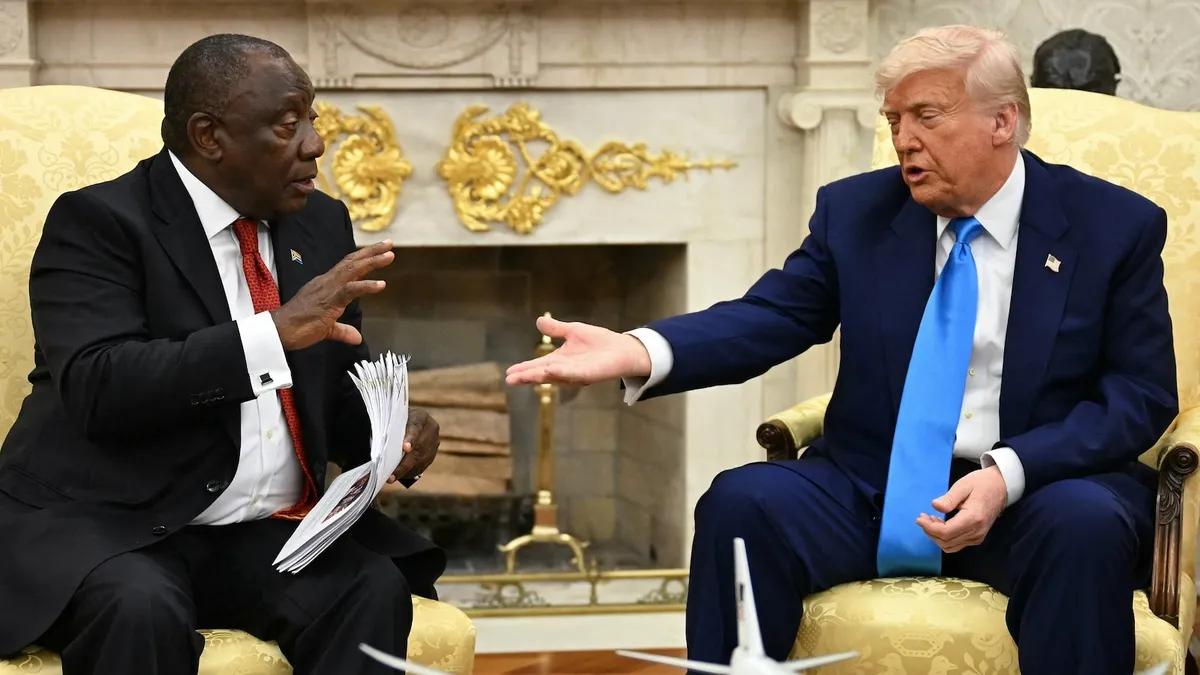
On Wednesday, President Donald Trump and South African President Cyril Ramaphosa engaged in a heated exchange at the White House concerning Trump's controversial assertions of genocide against white South African farmers. The Oval Office witnessed an unusual moment as Trump dimmed the lights to showcase videos on a TV monitor, which he claimed supported his allegations. Ramaphosa was visibly taken aback by the unexpected presentation and, at times, expressed that he had not seen the videos being aired.
The origin of the videos displayed during the meeting remains unclear. Trump also presented what he described as news articles highlighting violent incidents against white Afrikaner farmers. “I don't know, all of these are articles over the last few days, death of people, death, death, death, horrible death,” Trump stated. He further claimed that white South Africans were fleeing their homeland due to rampant violence and racist legislation, asserting, “This is sort of the opposite of apartheid. What's happening now is never reported. Nobody knows about it.”
In response, Ramaphosa countered Trump's narrative by emphasizing that the clips played during the meeting do not represent government policy. He clarified that the individuals featured in the videos were from extremist fringe political groups and not reflective of mainstream South African society. “There is criminality in our country. Unfortunately, people who get killed through criminal activity are not only white people; the majority of them are Black people,” Ramaphosa stated, urging Trump to listen to the authentic voices of South Africans to gain a more accurate perspective.
The South African government has vehemently rejected accusations of genocide against Afrikaners. Ramaphosa pointed out, “If there was Afrikaner farmer genocide, I can bet you these three gentlemen would not be here, including my minister of agriculture.” He highlighted the importance of understanding the full context of the situation in South Africa.
Throughout the meeting, Ramaphosa attempted to redirect the conversation towards trade and economic investment, which he stated was the primary objective of his visit. However, Trump repeatedly brought the discussion back to the treatment of white South Africans. When asked what actions he expected from Ramaphosa and his government, Trump surprisingly conceded, “I don't know.”
Notably, Elon Musk, a South African native and a prominent adviser to Trump during his presidency, was present during Ramaphosa's visit. Musk remained silent during the exchange and was seen standing behind a couch. Trump remarked, “Elon is from South Africa. I don't want to get him involved. That's all I have to do. Get him into another thing. But Elon happens to be from South Africa. This is what Elon wanted,” he chuckled.
Recently, dozens of Afrikaner refugees have arrived in the U.S. after having their applications expedited under an executive order signed by Trump in February. This order, titled Addressing Egregious Actions of the Republic of South Africa, claims that the South African government has enacted laws permitting the seizure of agricultural properties owned by ethnic minority Afrikaners without compensation, violating their citizens' rights. It instructs that the U.S. will not provide aid to South Africa and will promote the resettlement of Afrikaner refugees.
The law referenced by the Trump administration aims to rectify land injustices from the apartheid era, stating that land can be expropriated in the public interest, typically requiring compensation as agreed upon by property owners or sanctioned by a court. Experts have noted that this law is comparable to similar eminent domain legislation worldwide. Ramaphosa has previously argued that the white South Africans resettled in the U.S. do not meet the criteria for refugees, who are defined as individuals fleeing persecution due to race, religion, nationality, or political affiliation.
Trump's prioritization of Afrikaners has drawn scrutiny, particularly as he pushes to restrict immigration from other regions, including Afghanistan, Venezuela, and Haiti. Secretary of State Marco Rubio defended the administration's stance during a Senate panel, stating, “I think those 49 people that came strongly felt they were persecuted, and they passed every sort of check mark that needed to be checked off.” Rubio added that the president identified this as a significant issue and aimed to use it as an example.
In contrast, Democratic Senator Tim Kaine of Virginia expressed skepticism about the claims of persecution against Afrikaner farmers, describing them as “completely specious.” He noted that the U.S. did not admit Black South Africans during the apartheid period. In response to the criticism, Rubio maintained that the U.S. has the right to determine its immigration policies and prioritize which individuals to admit.
As the dialogue surrounding the treatment of white South African farmers continues, the implications of these discussions on U.S.-South Africa relations and immigration policies remain to be seen.